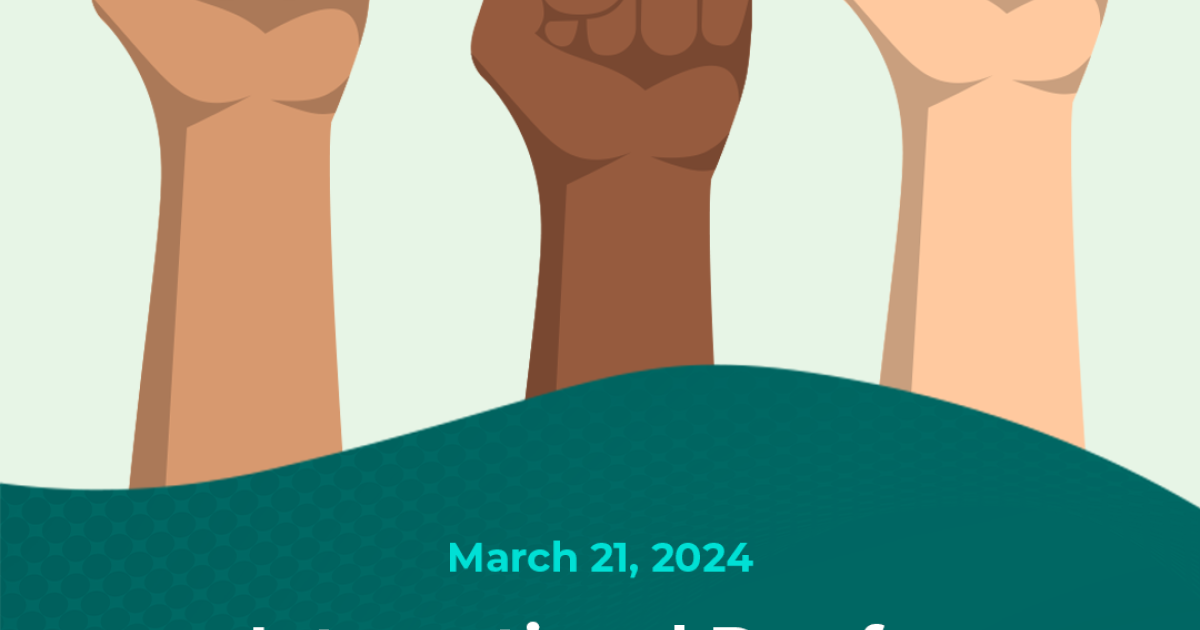International Day for Elimination of Racial Discrimination: March 21

RNAO condemns all forms of racism, oppression and discrimination, and is committed to working with elected officials and health organizations to end systemic racism and discrimination in nursing and health. Racism is a social determinant of health and a key driver of health inequalities among Black and other equity-deserving communities. It also harms the nursing profession and health system and undermines efforts to retain, recruit, and invest in nurses and the nursing profession.
We are committed to prioritizing equity, diversity and inclusion (EDI) across all aspects of our work and advocacy. As a priority, the association recommends addressing all regulatory proposals by the government and College of Nurses of Ontario (CNO), professional development opportunities and career advancement pathways with EDI top of mind.
In February 2022, RNAO’s Black Nurses Task Force (BNTF) – comprised of 17 Black nurses and nursing students working in various sectors of the health system – released a comprehensive report with 19 recommendations identifying changes needed to eliminate the systemic and structural anti-Black racism within the profession and the broader health system. As a result of RNAO’s ongoing work and advocacy, many of the recommendations have since been implemented and others have been woven into RNAO’s provincial and federal pre-budget submissions and other submissions to government on needed changes to proposed legislation and regulations. In its recent submission to the provincial government on the Fixing Long-Term Care Act regulations, RNAO points to evidence of discriminatory experiences as a major reason for nurses leaving a home. The recommendations in the report outline ways to address this, including the collection of race-based data, as well as the implementation of cultural safety education and awareness building at individual, organizational and policy levels. For more on RNAO’s journey addressing systemic anti-Black racism, visit the Black nurses and RNAO In Focus webpage.
As a result of the recommendations outlined in the BNTF’s report and RNAO’s strong advocacy, the CNO announced in February 2024 that they will begin to collect race and equity-based data through its first ever Workforce Census survey. This survey – sent to approximately 200,000 nurses – will provide meaningful data to highlight gaps in EDI faced by racialized nurses.
The Indigenous Health Program at RNAO continues to expand its partnerships with provincial and national Indigenous groups by developing and creating new evidence-based best practice guidelines (BPG) with and for Indigenous communities. RNAO also continues to expand its work with Indigenous health providers through its Best Practice Spotlight Organization® (BPSO®) program, weaving its BPGs and scientific evidence with local Indigenous traditions and knowledge to support community health and wellness. And, RNAO’s Indigenous Nurses and Allies Interest Group (INAIG) works to ensure Indigenous representation and education in nursing and health-care settings to create safer, more inclusive and accessible spaces for Indigenous peoples. For more on RNAO’s work towards reconciliation and collective action with Indigenous Peoples, visit the Indigenous health and RNAO In Focus webpage.
At Queen’s Park Day on Feb. 29, RNAO’s board of directors and assembly of leaders spoke directly with their local MPPs about ways to address systemic racism and discrimination in nursing and health. To prepare nurses for their meetings with MPPs, RNAO hosted two lively, informative panels focused on EDI in nursing and the health system. Members from three RNAO interest groups (IG) – the Black Nurses Leading Change IG, the Indigenous Nurses and Allies IG and the Rainbow Nursing IG – spoke about their lived experience in the nursing profession and health system and addressed ways to move forward. Other racialized nurses, Indigenous and/ or 2SLGBTQI+ nurses also face discrimination, stigma and prejudice. All nurses and other health professionals deserve to work in safe, respectful environments so they can remain focused on providing quality care and advancing in their profession.
RNAO’s Health Equity Consortium responds to needs identified by RNAO’s health equity IGs to discuss experiences with discrimination, dismantle systemic racism in the nursing profession and create safe spaces for people who access health care. It provides a supportive environment for quarterly meetings in which representatives of these groups reflect on and discuss perspectives, priorities and opportunities for collaborations to address inequities in the nursing profession and health system.
In consultation and partnership with equity-deserving groups and nurses, RNAO will continue pursuing a future in which systemic racism and discrimination no longer plagues the nursing profession and health system.
